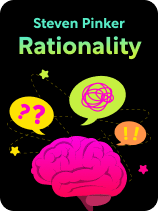

This article is an excerpt from the Shortform book guide to "Rationality" by Steven Pinker. Shortform has the world's best summaries and analyses of books you should be reading.
Like this article? Sign up for a free trial here.
When is it rational to act irrationally? How might irrational thinking devastate an entire community?
Steven Pinker examines how people make rational decisions as part of a group. He discusses game theory, which looks at how rational thinking is affected when the needs of an individual are pitted against the needs of others. In this context, he explains the zero-sum game, the volunteer’s dilemma, and the tragedy of the commons.
Continue reading to understand rationality in game theory with examples from Pinker.
Rationality in Game Theory
Pinker shows how rationality in game theory demonstrates two intriguing phenomena. Sometimes, acting irrationally can be the most rational choice. Also, people can be convinced to make rational choices when they’ll see benefits from those choices only if everyone else chooses rationally as well.
(Shortform note: In The Undercover Economist, Tim Harford defines a game as an activity in which predicting another’s actions affects your decisions. With this definition, many situations in our lives can be considered games, like driving, where how you drive depends on how others are driving.)
#1: The Zero-Sum Game
Pinker first examines how game theory shows that sometimes, a rational person must make choices that are, on their face, irrational, such as when opposing another person in a competition. This happens in a zero-sum game—a match-up that produces one winner and one loser (so that the “positive” win and “negative” loss add up to a sum of “zero”). In such a contest, unpredictability has an advantage, as it prevents the other person from preparing a response.
This is why, for example, a tennis player will try to serve the ball unpredictably, even if, say, her strongest serve is to the right side of the court. If she acts “rationally” and always serves her strongest serve (to the right), her opponent will predict it and prepare to meet it. Thus, her most rational move is to act randomly and irrationally.
(Shortform note: Some posit that the advantages of unpredictability are so important to human interactions that they’ve even influenced our evolution—and it might explain why some people are left-handed. In the same way that an irrational choice brings an advantage of surprise in a zero-sum game, left-handedness brings an advantage of surprise in hand-to-hand combat, favoring the person throwing the unexpected punch. Scientists theorize that the reason left-handedness is not more common, given this advantage, is that were it more common, it would no longer have the advantage of surprise. Thus it might be a somewhat self-limiting evolutionary adaptation.)
#2: Volunteer’s Dilemma
A volunteer’s dilemma is another situation in which a person’s best choice might be an irrational one. In this dilemma, one person must do something dangerous to help the group as a whole. If they’re successful, they’ll save everyone (including themselves). But, if they fail, everyone will suffer—and they’ll suffer most of all.
For example, let’s say you’re marooned with a group of friends on an island and to get off the island, one of you must swim across shark-infested waters to get help. If you succeed, everyone will be saved, but if you fail, the rescue boats won’t know where the group is—and you’ll be eaten by sharks. The question becomes, who will volunteer for such a task?
A volunteer’s dilemma is similar to a zero-sum game in that the incentives of the individuals are in conflict—no one wants to be the one entering the water. However, the end result of this dilemma is not zero-sum: If the volunteer succeeds, everyone wins. If the volunteer fails, everyone loses.
In such a situation, everyone’s individual rational choice is to let someone else volunteer and put themselves in danger. However, if no one volunteers, everyone loses. Thus, in order to ultimately choose rationally so that everyone has a chance of survival, someone will have to irrationally put themselves in danger.
(Shortform note: Psychologists point to the similarities between the volunteer’s dilemma and the bystander effect, in which people are less likely to help someone when other people are present. In both the volunteer’s dilemma and the bystander effect, people are less likely to act because of a “diffusion of responsibility”: when there are more people, each individual assumes someone else will take on the responsibility to carry out the necessary action. In large groups of people, the volunteer’s dilemma can be especially dangerous because it leads to no one stepping up. If you were on the hypothetical island with a hundred other people. You might ask, “Why should I be the one to put my life on the line?”)
#3: The Tragedy of the Commons
The tragedy of the commons is a dynamic that applies to situations involving shared resources, where everyone in a group has an individual incentive to take as much of that resource for themselves as possible and contribute as little as possible, which ultimately harms everyone. For example, each fisher in a village will be incentivized to catch as many fish as they can, so that others don’t take them first. Unfortunately, if everyone is fishing aggressively, the stock is soon depleted and then no one has enough.
The same dynamic shows up in any situation where a public good is shared, be it roads, schools, or a military force—everyone benefits from using these things, but each individual benefits more if others pay for them. This dynamic also affects how the world’s environmental crisis plays out, as each individual or country is incentivized to consume energy and resources as they wish, hoping that others will curtail their own use. However, those others have the same incentives to use as much as they want to, too.
Pinker writes that the most effective way to manage this dilemma is to remove the choice from individuals and instead have an outsider regulate people’s decisions—specifically, a government or organization that oversees how much each individual can take from the shared resource and establishes rules or contracts that individuals must abide by. When “free riders” are punished for taking too much or not contributing enough (through fines, for example, for failing to pay taxes), everyone is more likely to refrain from the self-benefiting behavior that can drain a public resource because they can trust that others are also refraining.

———End of Preview———
Like what you just read? Read the rest of the world's best book summary and analysis of Steven Pinker's "Rationality" at Shortform.
Here's what you'll find in our full Rationality summary:
- Why rationality and reason are essential for improving our world and society
- How you can be more rational and make better decisions
- How to avoid the logical fallacies people often fall victim to






